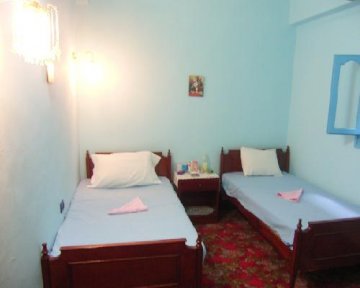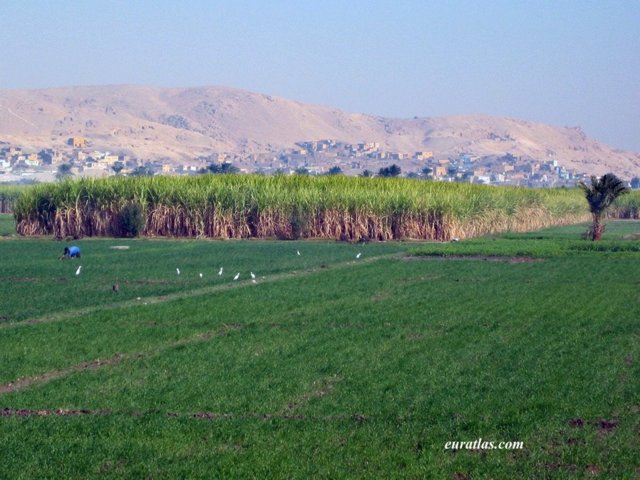I recently spent 5 days in Siwa and recorded some notes and observations and musical interludes. I'm not intending to cover in any detail information you can get yourself from guidebooks or the internet, mainly just personal impressions.
Siwa is an oasis in the Western Desert, around 550km as the crow flies from Cairo, 50km from the Libyan border. It is a lovely place for a restful quiet holiday. We weren't staying in the town itself, but were there until 11pm ish most evenings. It is pretty conservative and I didn't see any obvious signs of any kind of 'nightlife'.
Do please read the Important notes towards the bottom of this post.
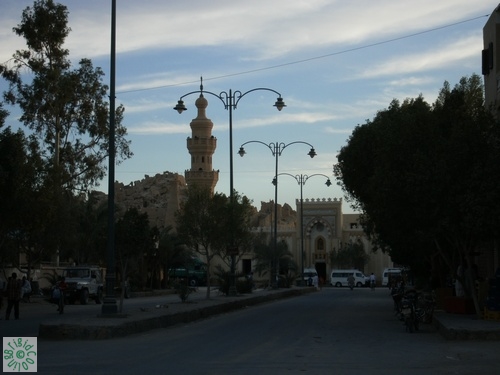 |
| Siwa at dusk |
Essential equipment:
torch - I highly recommend this tiny windup LED torch from Maplins. No batteries necessary.
handsanitizer
something warm to wear
women - you should cover your upper arms, shoulders, cleavage.
Monday 17/10 - depart Cairo travel overnight to Siwa
I took the West Delta nightbus from Cairo Turgoman (Cairo Gateway) bus station. I have described this bus station
elsewhere. I will also add that there is now, as I write, a large supermarket upstairs where you can stock up on supplies, plastic cutlery and so forth.
There is also an office downstairs in the departures area where you can leave your bags for 5LE, great as I arrived 2.5 hours early having allowed plenty of time to travel from my home at rush hour. There is a toilet at ground level (first floor for Americans) which costs 1LE and is reasonable in cleanliness terms.
I did hum and hah about whether I should wear a hijab to travel or not, but didn't, though I do have a 'pull on' which can be worn as a neckerchief and pulled on quickly should I feel the need.
The bus was due to leave at 7.45pm but actually departed just after 8pm. My experience of the cross-country buses is that they are normally very very punctual, so don't be late!
The bus was around half full and there were three women including me. Of the two Egyptian women - one wore hijab and the other was uncovered. Apart from one or two mildly curious glances, I experienced nothing untoward or hassly while waiting for the bus or on the whole journey and people were very helpful - as I usually find.
We made a couple of pick-up stops in Cairo, I think one was at Tahrir bus station and the other on Zamalek. Tickets were checked by an inspector at the second stop. As I joked to my Facebook friends, the one thing that never stopped during or after the revolution was bus ticket inspections!
We headed out of Cairo on the Alex. Desert Road. The lights were dimmed fairly soon after we left Cairo and everyone else was spark out so it would have been very difficult to read. Thank goodness for my relatively newly acquired internet-friendly woodwork (as opposed to smart) phone so was able to
bore entertain my friends
senseless with a minute by minute account of my 10 hour journey!
Strangely, our journey was not accompanied by any loud slapstick Arabic movies! However, we did have a constant background of classical Arabic music (which I quite like) followed by Koran recitations from around 4am. The volume wasn't too obtrusive though, and I'm all for anything that keeps the driver awake!
Our first stop was Marsa Matrouh just before 2am and we had a 30 minute rest break. (On the return journey we also had a short rest break between MM and Cairo). The other two women and most of the rest of the passengers disembarked there, so I was the only female and foreigner at MM bus station! Again, a few curious glances but nothing remotely harassing. There is a cafe area with tables both inside and out and a couple of stalls selling cold drinks, snacks etc..
I was directed to a women's toilet that was completely gross - possibly luckily there was no light but for the tiny LED torch I carried with me (and which proved invaluable on a number of occasions during my trip!) - note that on my return journey, I discovered a much more user-friendly toilet with a 25 pst fixed entrance fee.
Musical interlude:
Maria Muldaur - Midnight at the Oasis - Youtube
We left Marsa Matrouh and headed straight for Siwa, another 3.5 hours ahead. Only about 5 passengers remained on the bus for this last leg of the journey. We didn't stop at all on the way there, though on the return journey, we did stop at the rest house between Siwa and MM.
Just before Siwa, we passed through an army checkpoint and all IDs were checked. This is completely normal in Egypt and anyone travelling will be used to it.
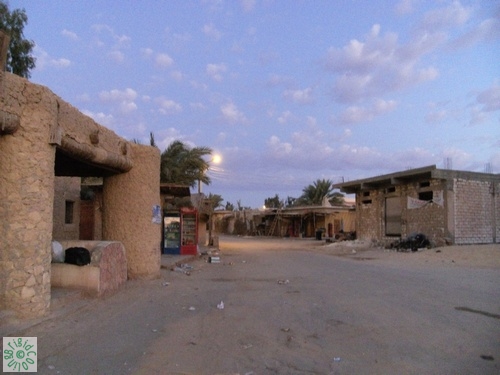 |
| Siwa bus station at dawn |
We arrived just as dawn was breaking, shortly before 6am. A few 'taxi-motorbikes' (these are carts drawn by motorbikes) were waiting for passengers, but I didn't know where I was going! My friends had arrived from Alexandria the day before and had texted overnight to say they had arranged for a taxi-cart to meet me, and this turned up after a few minutes - just after a second bus, probably from Alexandria, arrived.
 |
| Road out to my accommodation, just after dawn. |
Musical interlude:
Cat Stevens - Morning has Broken
We were staying 3km out of town in a private home so I am not able to share details of the accommodation with you (but it was very nice!) and the ride out there was chilly in the open cart! Fortunately, I had the pull-on hijab round my neck to pull up over my head and also I had brought with me for the journey a British Airways blanket liberated from a plane by a friend a couple of years earlier and left in my flat.
I arrived at the house and one of my friends let me in and showed me my room where I promptly went to bed and slept for a couple of hours.
Tuesday 18/10 - cycle to Siwa, cabaret by moi, Cleopatras spring, taxi incident
After dosing up on caffeine and abluting, we set off for Siwa. My friends had arranged bicycles, but, lack-a-day, I hadn't had a bike as a child (deprived - sob!) other than for around 3 months aged 13 and didn't possess the necessary skills. I proceeded to perform the afternoon cabaret for Siwa by skidding in sand and falling off the bike deeply grazing my hand, skinning my knee and bashing my leg (which a couple of days later came up into a fetching black and blue bruise) to the laughter of a quantity of small boys.
Musical Interlude:
The Mixtures - Pushbike Song - YouTube
I was helped to my feet by various people. Fortunately, I had thought to pack some fingerless gloves (woollen not lacy - I was into N
WOBHM not New Romantic) and they were shoved into my backpack, so after cleaning the cut with sanitized handwash which I usually carry around with me, I was able to wear those to protect my grazed hands while we continued to ride into town. (Yes, you're right. I was a Girl Guide you know, dib dib dib!).
When we reached the town, we went to one of the numerous bicycle repair shops to get a few tweaks made to each bike. I left my bike there because there was no way I felt able to ride it further. I felt bruised and battered in various areas of my body. Put it this way, if you are planning to cycle on holiday and haven't ridden since you were a child, then DO get some practice in before you go.
Contrary to what it says in one of the guide books, Siwan women can be seen! Most of the time they can be seen in small groups riding on the ubiquitous donkey carts. Almost all of them wear the same blue and silver-patterned veils with a black full-face (not even eyes showing) face covering. I did see just a couple with the blue and silver veils with uncovered faces, and a handful of women wearing black abayas and niqabs (with eyes showing). The women wearing 'normal' hijab seemed to be mainly Egyptian tourists from Cairo or Alexandria.
After a tea, we walked out along the road to the Temple of the Oracle which we visited later in the week and then on to Cleopatra Springs. Here, there was a big cold pool with one boy diving and swimming. We didn't partake of the opportunity!
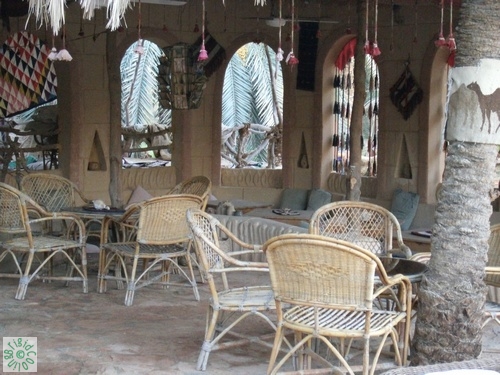 |
| The cafe at Cleopatra springs. The photo does not do it justice. It's very pleasant. |
There is a nice cafe there with a big pool table. We stayed there a while and had an early evening meal of falafels, omlettes, soup and so on. The lemon juice and banana juice were lovely. There was an amusing mix up when I asked for 'banana juice' and the guy thought I had asked for 'bi nana' (ie lemon juice with nana - mint!). Luckily one of my companions was happy to have a second lemon juice while I got the banana juice. There is also a small handicraft shop there. I don't know if the cafe is open at night, but I think it would make a really nice place to while away an evening if you were travelling in vehicles.
Just before sunset, we commenced our walk back to the town and onward back to our lodgings.
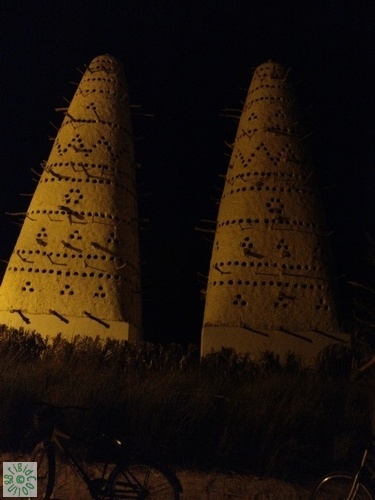 |
| Two pigeon loft towers Notice the bike in the foreground to give an idea of size. These towers (I found out a few days ago, coincidentally!) are provided for pigeons to roost mainly to collect pigeon guano to use as fertilizer. |
We had hoped that we might catch the annual 'forgiveness' festival but it was cancelled this year, nothing to do with the revolution, I did get an explanation off someone but I didn't entirely follow it!
 |
Beware the Judderman my dear, when the moon is fat.. (with apologies to the makers of Metz drink)
Walking back from Cleopatra Springs in the dark, all a bit 'Narnian'. |
We collected my bike and I attempted to start riding it but knew that there was no way I was going to make it in the dark. At that point, our self-appointed guardian showed up on his motorbike and said he would take my bicycle back on his motorbike and arranged a taxi for me.
There follows the only scarey incident I have had in Egypt (well apart from a bus crash in Haram Street a couple of months back but no bones were broken). People who know me know that I suffer very little - practically zero - sexual harassment in this country. I don't know why that is, but I have had very very few incidents and none of them scarey. Until this evening. The taxi had about 8 army guys on top and he was driving them out to their camp which was the same side of town as our accommodation. I never ever normally sit in the front of a taxi (I don't do it in the UK, why would I here?) only if I am with other people. However, this was a 2-seater truck and the back was full of military, so I sat next to the driver, there being no other place.
He drove to the camp and they got off. On the way, we were chatting amicably about Egypt, the revolution and so on and he had some back history working at one of the big factories conducting strikes back around 2008 which may have been precursors to the revolution.
Then after the soldiers had got off, he started asking my age and saying he thought I was only 21 and jokey stuff like that. Then he patted my knee (and let me be clear, that is as far as anything physical got) and afterwards I thought I guess I should have said "haram" (forbidden) but I tried to ignore it. The surrounding countryside was pitch black, deserted, and I had no idea where I was. I couldn't just get out and get another taxi because there was no one for miles!.
Then he started making comments about 'six' and pushing his two forefingers together which is a sign used over here to indicate sex act and saying we would be good together. I responded by saying "mish fahma" (don't understand) though I did very well understand.
I was getting quite scared because he was a big bloke and obviously knew where he was while I hadn't a clue and I was locked in his truck. Fortunately, self-appointed guardian (SAG) suddenly loomed out of the gloom on his motorbike and it turned out we were very near the accommodation. Anyway, that was a relief. I had to wait with SAG outside (luckily there was some outside lighting!) until my compadres returned on their bikes with the key.
When they returned, I told them what had happened. I was persuaded to tell SAG who promptly called the man's boss and told him what had happened. A lot of heated discussions followed and to cut a long story short, the man was forced to return and apologize to me (while insisting it was a misunderstanding - claims he was saying 'sixty' - but it was me demonstrating the finger gesture which convinced them) and he was fined 10 days pay.
They left the place we were lodging and some very heated arguments followed on the night air. It may be a rougher justice was administered out of earshot - not unknown here. It turned out the taxi driver was a friend of our SAG and he was mortified and embarrassed by it as he felt he had lost face by not protecting us enough. Anyway, the incident was over and dealt with.
Do please read the Important notes towards the bottom of this post.
Wednesday 19/10 - walk into Siwa, gabal mawti, tea in a shop.
Due to my inability to ride a bike, my companions gracefully agreed to walk (pushing their bikes) alongside me into town. I took copious notes of the exact route so I could find my way back!
En route, we passed the Gabal Mawti (mountain of the dead) and though it wasn't originally in our itinerary for the afternoon, we decided to explore. The mound holds many remains of tombs from 26th Dynasty/Ptolemaic/Greek and Roman times and these were used as hide-outs during WWII. What we took to be the ticket booth was unmanned so we clambered around the place.
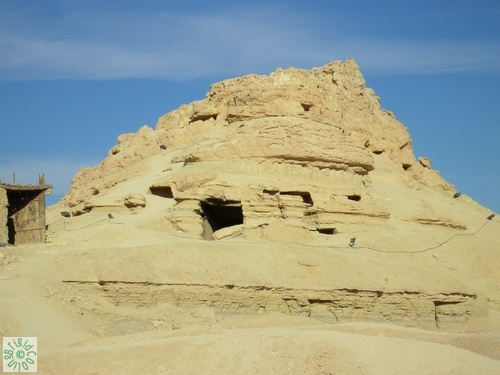 |
| Gabel Mawti (Mountain of the Dead) |
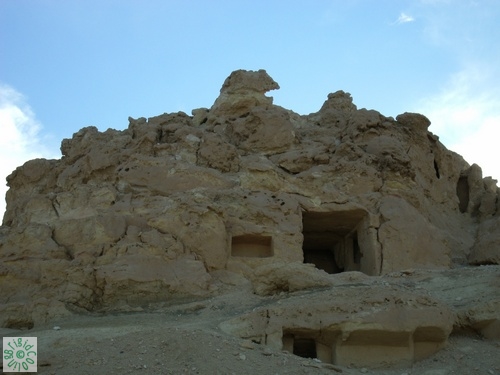 |
| Gabel Mawti - tomb entrances |
At some point in the proceedings we were found by two ticket collectors and handed over the requisite funds (currently 25LE for regular tourist and 15LE for student) in exchange for a pretty ticket.
After doing so, we were granted entrance to the padlocked tomb No. 1. One visitor at a time and absolutely no photos with or without flash. This tomb from the 3rd Century BCE contains paintings of Nut on the ceiling and other paintings. Apparently there is also a tomb with mummies in it from 1500BCE, but we didn't know at the time and weren't offered an opportunity to visit, so whether it is still open to the public I don't know. That said, it was late afternoon when we arrived but according to the guide books, it's only open 7am - 2pm.
After leaving the mountain, we continued into town and visited some of the gift shops. One of my friends had spent some time in Siwa previously so was welcomed as an old friend. We took tea in one of the shops with the owner before moving on to Abdu's Cafe, our evening meal base for the week.
My friends had their bikes to ride back, but after the previous night's occurrence, I decided to walk back rather than take a taxi and decided to pull on the hijab as it was out into the countryside. The walk took me around 50 minutes and the lighting ran out for the last 10 minutes or so and it was absolutely pitch black. If I hadn't had the torch, I would have had to wait where the lighting ran out for the others to come along on their bikes. We had grossly overestimated how long it would take me to walk back (because we had lost track of time on the inward journey and visited Gabal Mawti on the way) so they were around 30 minutes behind.
I had to refer to my notes once where the path was confusing, and luckily at a crucial turn a lorry had come along so I'd stood out of the way and seen the turn, otherwise I would have missed it completely!
Still, our SAG was roaming around on his motorbike checking up on our whereabouts and having gone right past me, unrecognized in my hijab, he realized that I must be one of 'his' girls and confirmed I was going the right way and around 10 minutes from home so if I had got lost, he would probably have found me and at least I know I can ride pillion if I have to!
Thursday 20/10 - morning tour to some sites, sunset at Fatnas, Gadaffi's death
In the morning we took a half day tour to three sites on the eastern side of Siwa: springs at Abu Shuruf and dangled our feet into the water for a while.
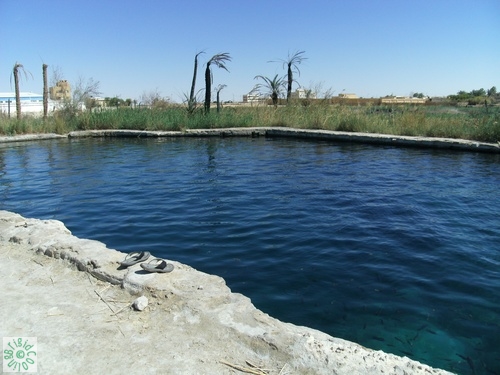 |
| Abu Sharaf springs. You can swim here, there is a small curtained off changing area, though if I were you, I would 'go Islamic' in your choice of bathing costumes! We didn't swim but a bunch of guys turned up and all jumped in. |
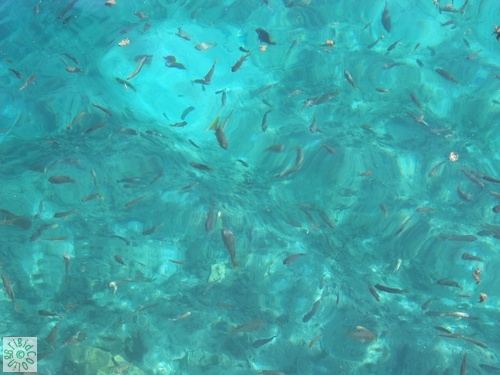 |
| Abu Sharaf springs - fish in the water. |
Afterwards, we went on to the abandoned village of Az-Zeitun. The mud-brick buildings are crumbling away and we spent some time imagining what it must have been like to live out there. Our driver said the village had been abandoned for many years - it had been abandoned even when he was a child - and he thought it was because the work of the villagers was farming dates and olives, and as production had become more industrialized, the villagers moved to where the larger scale farms were.
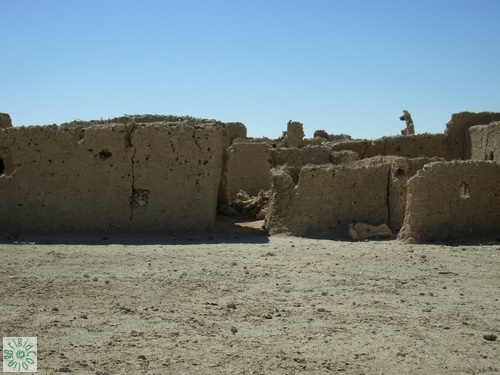 |
| Az Zeitun - abandoned village |
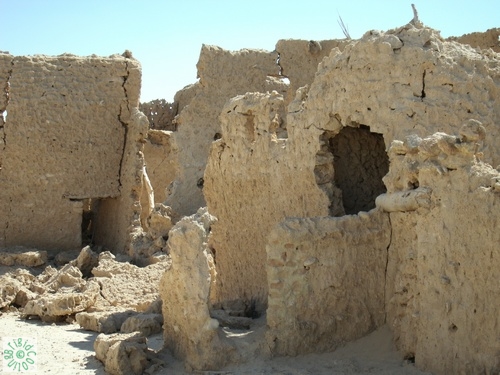 |
| Az-Zeitun abandoned village - see the crumbled mud-brick buildings |
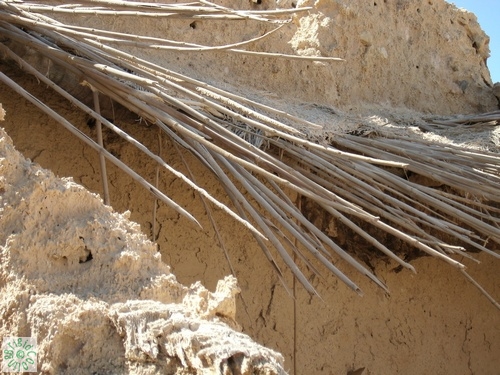 |
| Az-Zeitun abandoned village - the remains of a roof frame |
Lastly, a quick 'hello' to the village of Ain Safi where our driver introduced us briefly to some bedouin who lived there. According to the guide book, this is the last human habitation for hundreds of km south.
As the mid-day heat peaked, and having not realised that the tour was only half a day, we took ourselves and our picnics back to our lodgings. Two of us went for a walk along the waterways near where we were staying.
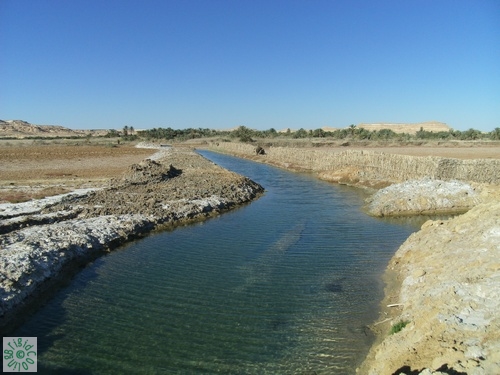 |
| Siwa - waterway near where we were staying. |
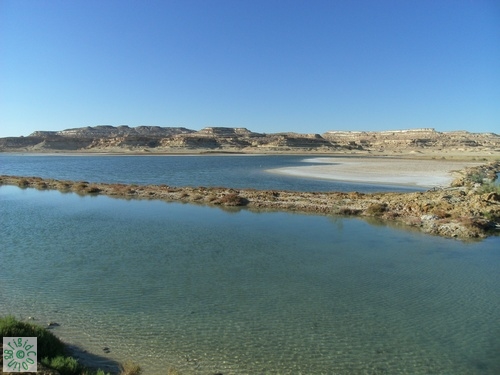 |
| Siwa - one of the lakes, this one near where we were staying. |
During the afternoon, a friend back in Cairo texted me to tell me that it was rumoured Gaddaffi had been killed but with no tv or internet, we couldn't check out what was going on. We had no electricity for around 12 hours a day - in common with outlying areas, our electricity came from a petrol generator which our SAG hand-filled with jerry cans, so basically it went off during daylight. (Our SAG was sort of a bowab - caretaker- for the place we stayed and lived near it).
Later, our driver from the morning picked us up to take us out to Fatnas Spring, a popular and attractive place to visit to watch the sunset. There were probably around 20-30 other people there and the atmosphere was quiet and contemplative. A small cafe served chai and limon. Quietly excited chatter stilled as sunset approached and we sat on the edge of the lake watching the sun go down in the distance. A few of us remained after sundown just gazing quietly out over the lake watching the beautiful colours of the sky.
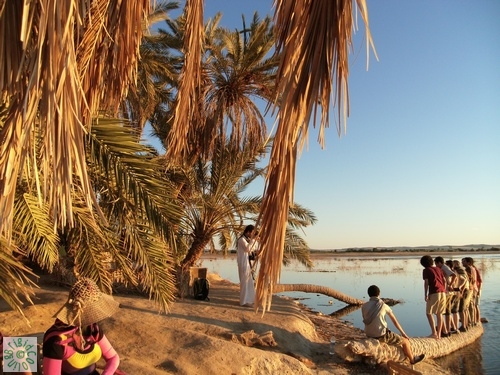 |
| Fatnas springs - waiting for sunset |
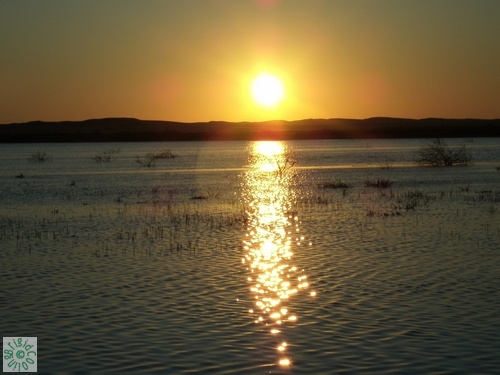 |
| Fatnas springs - the sun begins to set |
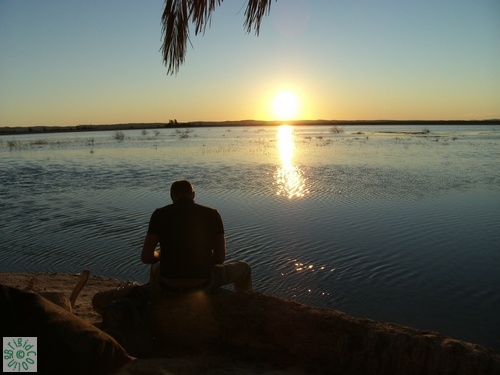 |
| Fatnas springs - sun setting |
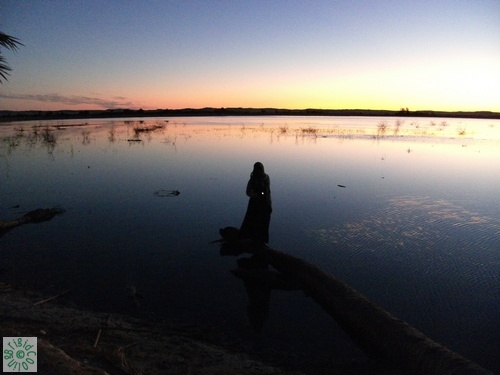 |
Fatnas springs - after sunset: the colours are beautiful and it's so peaceful and meditative. Quite a few people remained and just looked out quietly across the water.
Musical Interlude: Focus - Elspeth of Nottingham |
After leaving, we were driven into the town. We visited a store where there was a television on and watched Gaddaffi being manhandled by his captors. Later, I had occasion to visit a pharmacy where I watched an ancient tv in shocked silence, along with around 30 other people, as we saw mobile phone footage of someone shooting Gaddaffi in the head. It was an Arabic news channel, could have been Egyptian or possibly Libyan, being only 50km from the border. I was bemused by reports I saw on Western news on the internet for the next day or so querying how he had died, and suggestions he had been caught in 'crossfire' when many of us had seen someone who looked exactly like him getting shot in the left temple and killed with a handgun by an unknown hand.
The footage seemed to be playing on a loop and eventually the pharmacist turned over the channel as his little shop was full of people just staring silently at the screen.
From what I can gather, it seemed to be around another couple of days before the Western media saw this footage. I find that unbelievable to be frank.
I went back to Abdu's to meet my friends where we had our evening meal and then we took a ride home.
Friday 21/10 - very lazy day! walked into town for evening, back in a taxi
On Friday, we have a very lazy day back at our lodgings, dipping into the small, cold pool in the grounds. In the evening, two of us walked back into the town for our evening meal and took a ride home.
Saturday 22/10 - early bus ticket, Shalit fort, Temple of Oracle, departure back to Cairo
Today was my last day - my companions were staying another couple of days before making a long trek via desert to Luxor - so I had to go into town early to get my bus ticket. You can't buy a return ticket earlier than the day you are leaving, so I had asked the taxi driver of the night before to pick me up from the lodgings at 8am.
 |
| Just to prove it - there is a public toilet near the bus station - it is 'tardis' style. I didn't check it out so no idea what it's like inside! It can't be worse than the one I was shown to in Shalit Fort which was in a pitch black cubby hole, the entrance door only as high as my waist, and which consisted of nothing but a hole in the floor! |
After buying my ticket, I decided to spend some time exploring the Shalit fort as I was not meeting my companions until around 11am. The fort was abandoned decades ago, apparently after a particularly bad spell of rain caused the mud bricks to start collapsing. Previously, most of the town's inhabitants had occupied the fort. There are fantastic views from up there.
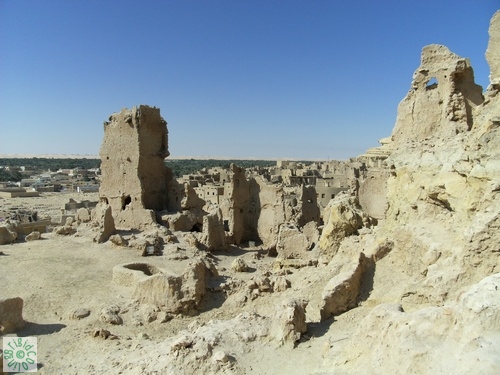 |
| Shalit Fort |
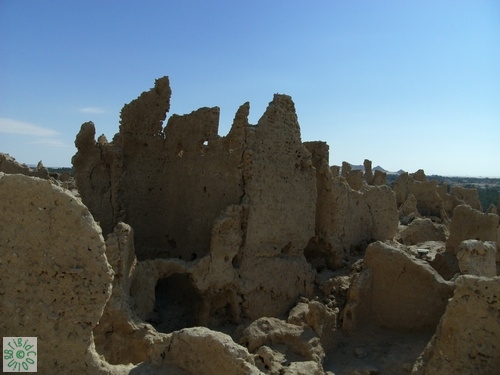 |
| Shalit Fort - see how the buildings are dissolving in the rain. Who needs CGI effects? |
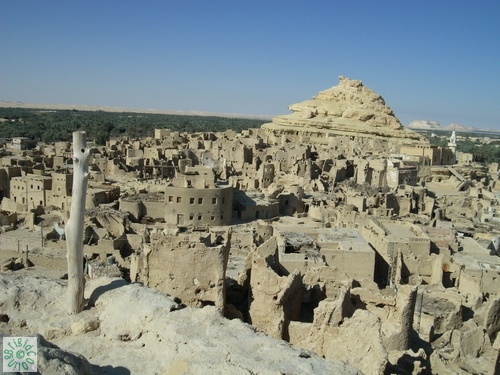 |
| Shalit fort - view across to 'Healing Mountain' - I think this is Gabal Dakrur |
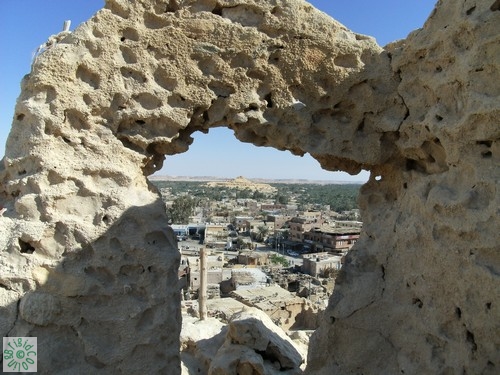 |
| Shalit fort - view across to Gabal Mawti |
I decided to try and leave by a back route which I eventually came across thanks to a mysterious, white dog who appeared and then disappeared. By going in his direction, I found a safe path rather than the more difficult route I had thought I would take. I wandered through some of the streets at the foot of the fort. In the shade, the streets were astonishingly cool - just shows that with the right attention to building design you don't need airconditioning!
I took a long, leisurely, circuitous walk back into the town. Two ladies in niqab (black abayas with eyes showing - quite rare as almost all of the women wear the blue and silver head covering with a black full-face veil - not even eyes showing) riding on one of the donkey carts wanted to shake my hand. They were friendly but wouldn't let me take their photograph. One of their sons was insistant that I did though in exchange for 5LE.
 |
| This photo cost me 5LE so I hope you appreciate it! |
I met up with my friends for lunch and we went over to the Temple of the Oracle. I took a taxi while they rode their bicycles because I needed to go back to the lodgings to pack before returning later for evening meal and then to catch the bus back to Cairo so it made sense. If I had walked, it might have got a bit stressful on the time front!
The Temple of the Oracle dates from around 600BCE and may have been built on the site of an earlier temple. There are both pharonic style and Greco- roman style elements visible in the temple.
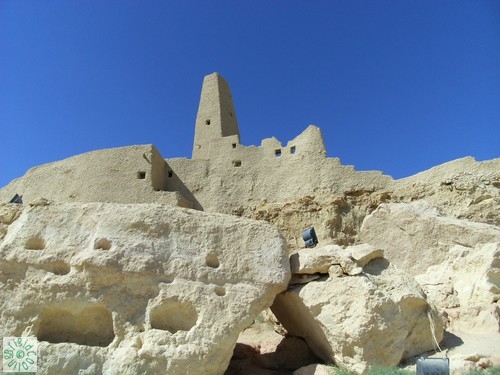 |
| Temple of the Oracle (Amun / Zeus) |
 |
| Temple of the Oracle - gateways |
Alexander the Great is believed to have visited and
"became a god 'mongst mortal men" (quote from Musical Interlude:
Iron Maiden - Alexander the Great - YouTube - I get my history from quality sources
wink) thus demonstrating to the ancient Egyptians that he was a true pharoah.
We had a good wander around then I left to go and pack. I returned back to the town later in a taxi and left my bags in the cafe while we had a last visit to Shalit fort to see the sunset from there over the town.
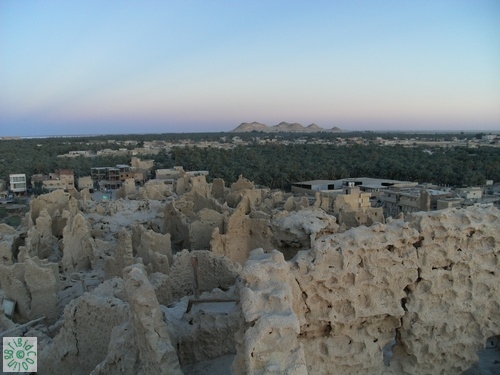 |
| View across Siwa Oasis from Shalit fort near sunset |
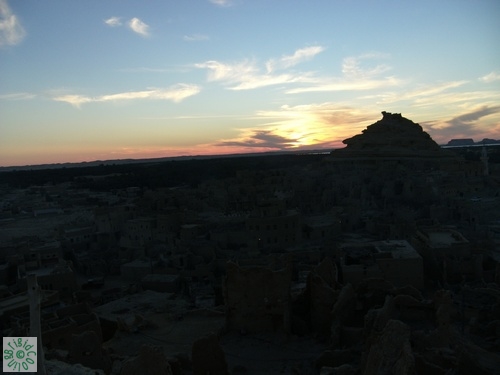 |
| Sunset over Siwa Oasis |
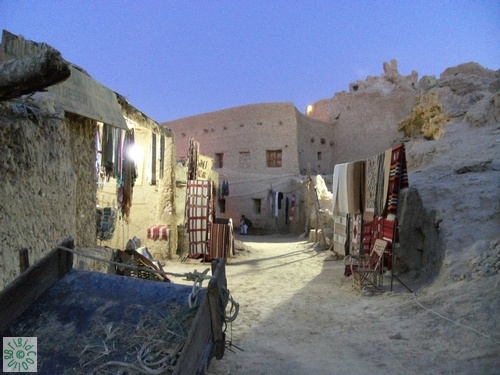 |
| Street leading up from Siwa to Shalit Fort. Just after dark, it looks a lot like a stage set here. |
I finally left my companions around 715pm and took my one and only donkey cart ride of the trip (I felt sorry for the donkeys hence my reluctance to take a ride in one any other time, though on the whole the donkeys seemed in better condition and better treated than what I have seen elsewhere in Egypt). The bus arrived at 730pm ready for 8pm departure and I found my seat.
The journey back was uneventful though the bus was very full. The onboard toilet was unspeakably horrific - I had a quick peek in there before leaving and decided that hell would have to freeze over before I would use it! Luckily on our journey back, we made 3 rest stops before Cairo, perhaps because of the state of the toilet!
Musical Interlude:
Madness - Night Bus to Cairo - Youtube (sorry couldn't resist)
There were 8 women on the bus, two foreigners including me. The other was a 19 year old Scandanavian girl. She was one half of a young Scandanavian couple who had just spent 3 months exploring various countries in southern Africa - including South Africa, Namibia, even Zimbabwe and a couple of others which I have forgotten - on their own by bus and backpack - kudos to them - they said nothing bad had happened at all despite all the warnings they had received though they had played safe by not going out after dark in most of those countries and were looking forward to doing so in Cairo. At their request, I scribbled a list of recommended places to try and see in and around Cairo as they were going to be there a week longer than originally anticipated.
As a side note, they had stayed in the
Desert Rose hotel in Siwa and said that the one person seemed to be the entire staff was incredibly helpful, nothing was too much trouble. As they were the only guests at the time, he asked them every day what they wanted to eat and what time they wanted it!
Out of the women on the bus, the 6 Egyptian women included 1 with niqab, 1 with hijab and 4 uncovered. (How do I know they were Egyptian? ID Card check point!)
We arrived back in Cairo around 5am - the bus offered the opportunity to get off at Midan Libnan but I didn't as I had a bag in the boot and didn't get the impression that the couple of people who did get off were collecting bags, though as the driver had a complete tantrum when the bus finally reached it's destination, because there was a case left in the boot and no one claiming it, maybe they forgot! It probably meant lots of paperwork for the driver hence him throwing his toys out of his pram.
I'm not sure quite where the bus terminated, I think it was the Tahrir bus station. It wasn't Turgoman (be advised that on my cross-Egypt bus journeys, the bus returning to Cairo has never terminated there!) and it wasn't the funny little East Delta place round the corner from Ahmed Helmy either. It was quite foggy and I was too tired to orientate myself precisely.
45 minutes later, I was safely delivered to my home by a taxi to the waiting paws of my loved ones.
Important Notes
Siwa is a VERY conservative place.
Tourist Women; We were told by one guy who works with a lot of tourists that unfortunately, the younger men who don't work with tourists hear tales from the taxi drivers and those in the tourist sector about what they might 'expect' from foreign women and thus them getting certain 'ideas'. In at least one case this ended up with an elderly (even more old than Oldbag) woman getting her arm broken. There are also a couple of warnings in the 2010 Lonely Planet guide which did not appear in my earlier edition so I can only assume these come about as a result of 'incidents'
concerning women walking alone in the Palm Garden: Don't do it, it's apparently extremely 'provocative'. A bit of googling will reveal to you that this area is known for 'goings on'.
Gay men: Siwa has an appeal to gay men which Siwans find increasingly annoying. Some sites on the internet tout the location as being a paradise for gay men. This is based on a tradition of same sex marriage which only died out in the early 20th century but which is often referred to on the internet. This was allowed because the fortified, defended nature of the traditional Siwa town required young men of the town to live outside the walls to guard it from marauders, incomers and so on and as they weren't allowed to live inside the town until age 40, same-sex marriage was permitted.
The current male population do not take at all kindly to being propositioned by western males acting under the misguided belief that attentions will be welcomed, and they may be dealt with 'harshly'. I got this information directly from Siwan men. If you are a gay man be advised that it is ILLEGAL to practice in Siwa as elsewhere in Egypt and you may find yourself in trouble both with the law and with the locals.
Local women: Most of the Siwan women wear a FULL face cover - including covered eyes. Almost all wear a pale blue cover with a black face veil. You can see the women riding around everywhere on donkey carts usually driven by boys. I did see just a couple of women without the full-face veil but wearing the blue cover. I also saw a few women in black abayas and niqabs (eyes showing). I was also told that apparently there are 'too many women' in Siwa so polygamy is very common.
Tourists: At the time of my visit, there were quite a lot of tourists in town, many Egyptians from Cairo and Alexandria, and also Europeans and Australians. Most seem to have come in privately hired vehicles so it seems the roads in that area are safe to travel. Talking to cafe and shop staff, there are very very few British or American tourists at present.
Desert Trips: A 3-day/2-night trip out into the White Desert and surrounding areas in a typical 4WD safarai jeep will cost you around 2500LE plus or minus a few hundred depending exactly what you want to do. This will be divided between however many of you share the vehicle. I've done a similar trip before from Bahariya Oasis to the south and it's worth the expense.
General notes:
Comparing information from my 2006 Lonely Planet guide, a friend's 2010 Lonely Planet guide, various internet sites and what was actually true on the ground regarding prices, times of opening, days of opening, accommodation, restaurants, and so on, in my few days experience and chatting to a couple of people, Siwa seems to be a town in constant flux so don't be surprised if something you plan for can't actual happen or doesn't exist now! We never found the tourist information office open - early morning, afternoon, or evening.
Bank: There is one bank, next to the police station, with an ATM that works 'most of the time'. This is the ONLY ATM in Siwa. One of my friends tried to draw money on a Saturday but no joy. Apparently this is normal on Saturdays.
Water: Much of it is salty so even with boiling, undrinkable. You need to make sure you have a good supply of bottled water for your stay.
Toiletries/Medicines: Take what you need, don't rely on being able to buy anything other than the most basic supplies that you might need there and it is a VERY long way (385km) to Marsa Matrouh - the nearest 'big' place!
Hospital: Just the one. Apparently during the revolution, the Siwans held their one and only protest there demanding 'proper' doctors. Deduce from that what you will.
Internet: There are a couple of internet cafes around. There's definitely at least one with Skype now following our visit! Also, my Mobinil mobile phone internet package worked fine too.
Mobile Phones: We found that all three Egyptian providers - Vodafone, Etisalat and Mobinil - worked fine in Siwa. If you are travelling out into the desert itself for a few days, you may have problems. I made a trip out to the White Desert a couple of years ago and the only service that worked out there then was Mobinil. Just be prepared! Might be worth investing in a mobinil SIM card just in case!
Getting around:
Siwa is quite a small place so you can walk much of it if you have good shoes.
The taxis are predominantly carts pulled by either donkeys or motorbikes, or you can hire bicycles. If you haven't ridden since you were a kid - get some practice in first - it HURTS. There was one place I saw renting out bikes with bigger saddles which might be better for you if you're not used to riding or are built for comfort more than speed (though having lost a considerable amount of weight, I can vouch that sitting as a thin person is far more painful than as a fat person) - I digress, but alas it was too late for me by the time I discovered it! It was just to the left of the main path up to Shalit fort.
Getting there:
There is no train service, so the only way to reach the oasis is either by private car/bus hire or on the public buses.
At present, there is just one bus a day (which travels overnight) between Cairo and Siwa and vice versa. More buses or public service cars travel between Alexandria or Marsa Matrouh and Siwa. The Cairo bus stops at Marsa Matrouh. Cost at present is 70LE one way and I believe it's the same price for Egyptians and foreigners (unlike buses to other destinations which may have different fares). I don't think you can buy a return ticket in Cairo and the other problem at Siwa is you can't currently buy a return ticket until the morning of the day you intend to travel and while I was constantly assured that the bus is never full, you never know....
I bought the ticket for my return journey in Siwa on the day of travel. Note you need 3 pieces of ticket - one that says 50LE on it and two additional bits which say 10LE on to make it up to 70LE. I asked the man in the office and he said it was because their book of tickets is so old that they are printed up with 50LE instead of the current 70LE price - all 3 portions get checked by the inspector on the bus so be sure to hang on to them all!
My friends travelled on the bus from Alexandria and the journey was only 1 hour shorter than coming from Cairo so unless you want to spend some time in Alexandria, don't think it will be quicker to go there and then to Siwa - getting to Alex will take you a good few hours!
Links about Siwa
Official Siwa site
Siwa wiki
Travels with Sheila - blog posts re Siwa
Photos watermarked using :
Batch Photo Watermarker





